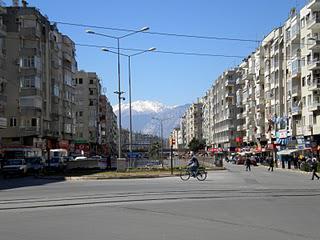
When I arrived in Antalya I was met at the airport by Mehtap, who welcomed me with a kiss on both cheeks. This is the standard greeting for friends and relatives. On the way to Mehtap's apartment, all I remember seeing was a sea of concrete apartment buildings that had seen better days, and lots of areas under construction, causing the dust that dirtied those buildings. It was a far cry from the tropical paradise I'd seen on the web. But I was not discouraged. I've been traveling off the beaten path since I was 15, when I participated in my first international tour with the Long Island Youth Orchestra as a violist. That summer we went to South America. When I was 17, we went to India, and three years later we went to China. One of the best things about these trips was that we often stayed with local families, rather than in hotels. My passion for more authentic, less touristic travel no doubt arose from these experiences.
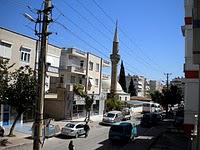
The mosque across the street.
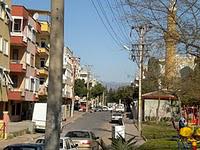
The street where I lived with Mehtap.
I remember staying with an affluent Indian family in Bombay. The neighborhood looked similar to what I was seeing here- a mass of concrete. But once inside, their apartment was lovely. The same was true of Mehtap's place. The furniture was modern, and they had two bathrooms. One was the traditional turkish, but the other was western style. Yes, I know the eastern style is actually more hygienic because your body has no contact with it, and after twenty years of studying yoga I was certainly capable of squatting. But I was happy to have a western toilet. I'd read about the limitations of plumbing here, so I knew toilet paper couldn't be flushed and had to go in the wastebasket. In the newer buildings (mine included) toilet paper flushes just fine. I take this as a sign of progress and evidence of Turkey's desire to modernize. On the other hand, I've also been to homes where toilet paper isn't used at all (there's a bucket of water for rinsing; drying is still a mystery to me). Okay, I'll stop writing about toilets now.Fadime had prepared dinner - lentil soup, peppers and zucchini stuffed with rice, green salad, and of course ekmek, the "public" (state subsidized) poofy bread that accompanies every meal. Mehtap and Fadime are not vegetarians, but Fadime never cooked any meat, fish or chicken while I was there. On days when they worked late they would sometimes pick up a type of fast food that was like soft flour tortillas with a bit of ground meat inside. Otherwise dinner always started with soup, usually one of the myriad varieties of lentil soup.
I'd traveled through the night, so I had no problem falling asleep at the appropriate time. My twin bed was a bit hard for my taste, but I was sleeping quite soundly when I suddenly heard someone in my bedroom singing very loudly right into my ear. Actually, it was the Mosque across the street and the Muezzan's greatly amplified 5 AM call to prayer. Five o'clock in the morning. Really? The entire country is subjected to this every day? I thought this was a secular country? Well, it's a secular Islamic country, much like the U.S. is a secular Christian country. What about our separation of church and state, you ask? What about Christmas being a national holiday? (I ask, invoking my right as a Jew to answer a question with a question.) We have our legal right to religious freedom, and so do the Turks, but we have Christmas season and they have Ramazan. ( In fact, Christmas season is a lot more obvious. You could be in Turkey during Ramazan and not notice a thing.) The main difference is that the U.S. is only predominantly Christian, whereas Turkey is more than 99% Muslim. So nobody (but me) seems to mind the 5 AM wake up calls. Fadime gets up and prays, and then goes back to sleep. Mehtap sleeps through it. As it turns out, I eventually do too.
The next morning we wake up at 8 to get to the office where we have breakfast before starting my Turkish lessons. Breakfast is salty white cheese (called peynir, it's like a strong feta), tomatoes, cucumbers, black olives and of course the required ekmek, which is served whole at the table and ripped apart rather than sliced.
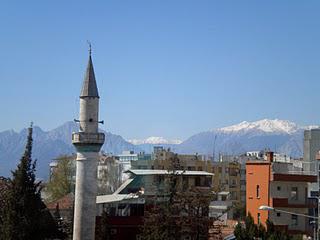
View from Mehtap's office, where I have my lessons.
After my 3 and a half hour lesson, Fadime takes me to the Marina for a drink (soft drink of course. As a practicing Muslim Fadime never drinks). On the way we stop at a tailor's where Fadime has to pick up some things. We are offered tea. Shopping here is a leisurely activity which almost always includes tea. I knew the carpet sellers at the bazaar would have tea, but I've also been offered tea at the pharmacy, telephone company and optician. It's not just at places where you'd expect to linger to contemplate the goods or to decide on a major purchase; anywhere you have to wait for something (except at government offices, of course) you will be offered tea. Nobody ever seems to be in a rush here. Running errands is just an opportunity for a stroll and a cup of tea.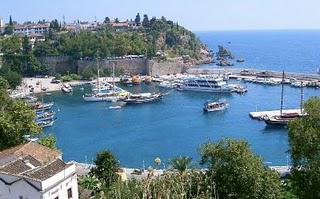
Overlooking the beautiful port and the old city is typical Eastern European square with an equestrian statue (of Ataturk) and a reflecting pool with fountains that perform to music and colored lights every night. The city is very clean. This is puzzling because there are hardly any public garbage baskets. I was told they were removed because the PKK (Kurdist separatists) were putting bombs in them.
In the 6 months I've been here, I've yet to see a homeless person. Why is this? Turkey has unemployment just like anywhere else. I think it's because of the strength of the family unit here. Anyone who can't support himself will live with a sibling, parent or cousin. Family pride prevents the weak link from shaming the others. Families are large here, so everyone has somebody who will take them in. (Either that or the the state surreptitiously rounds them up.) Most people live with family anyway. College graduates are expected to move back in with their parents and stay there until they get married. Fadime asked me why I didn't live with my parents. I had a good answer to this, since I'd been living in NY while they were in San Diego. Otherwise I would have had to explain the American version of independence which requires the adult child to establish her own home.
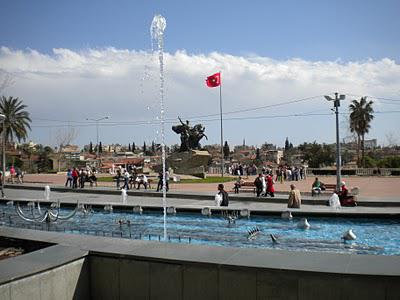
While I didn't see any homeless people, I did see quite a few homeless dogs. They looked pretty healthy. This is because the government collects stray dogs, neuters and vaccinates them, staples a plastic tag to their ear to mark them as safe, and sends them back out into the street where people casually feed them. I was initially very impressed by this, until I realized that the corollary is that all dogs are treated like street dogs; pet labradors are not allowed inside. Dogs with owners have collars instead of ear tags, but they're still outside and ignored. Very few people show any affection for animals here. I suppose this is understandable in a culture that has children raising a pet goat for the family to sacrifice on Kurban Bayram. Another reason dogs can't come inside is their inability to wear the slippers required inside Turkish houses. Also, apparently the Prophet Mohammed was a cat person.

